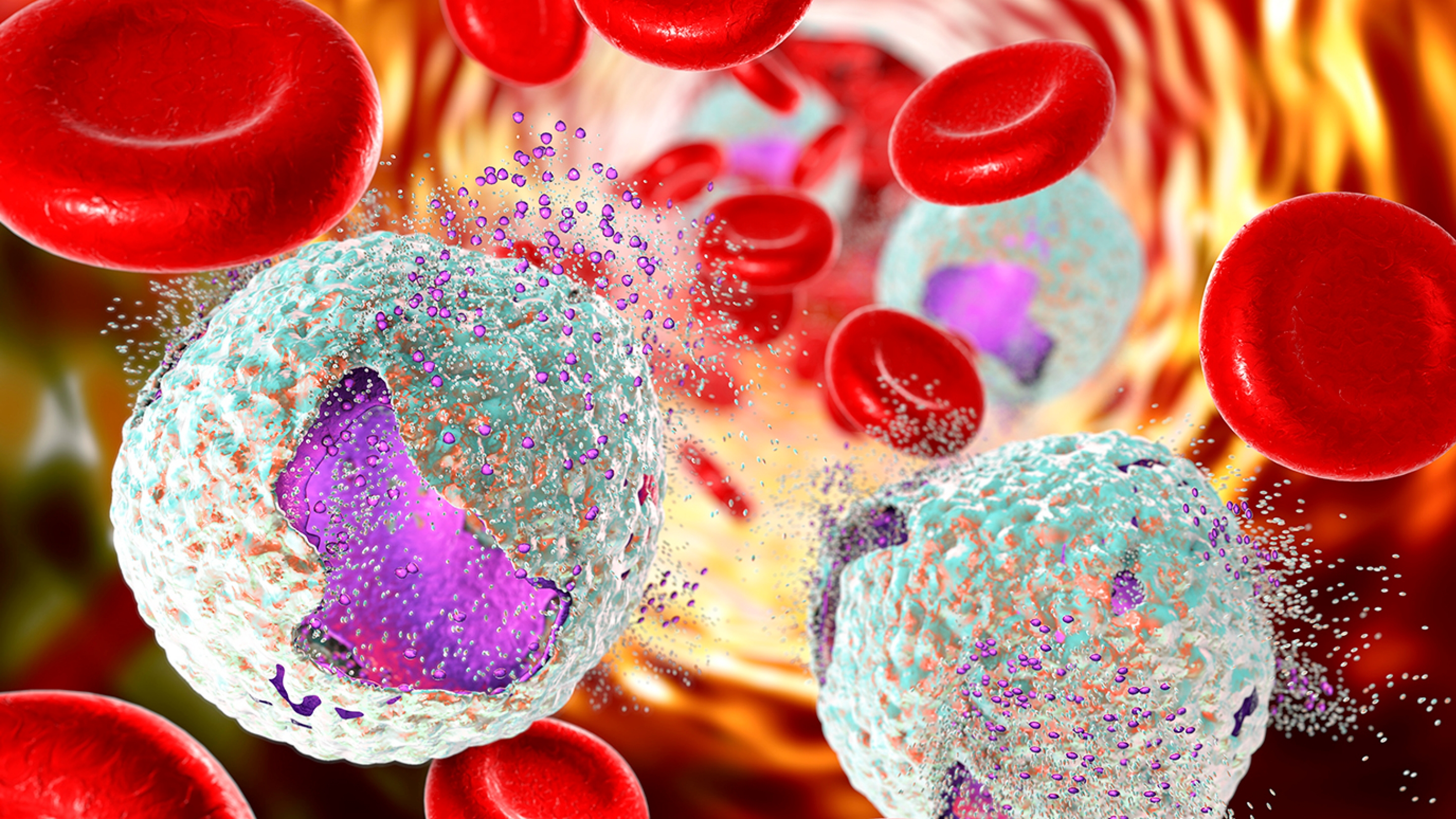Study Shows Combination Therapy Effective for ALL Patients
 A chemotherapy-free regimen was found to be safe and highly effective in patients with newly diagnosed or relapsed/refractory Philadelphia chromosome-positive acute lymphoblastic leukemia (ALL). According to a single-arm Phase II study by researchers at The University of Texas MD Anderson Cancer Center, a combination of ponatinib and blinatumomab produced high rates of complete molecular response in ALL patients. The study may support a regimen to produce complete remission with front-line therapy, without the increased risks associated with systemic chemotherapy or a stem cell transplant.
A chemotherapy-free regimen was found to be safe and highly effective in patients with newly diagnosed or relapsed/refractory Philadelphia chromosome-positive acute lymphoblastic leukemia (ALL). According to a single-arm Phase II study by researchers at The University of Texas MD Anderson Cancer Center, a combination of ponatinib and blinatumomab produced high rates of complete molecular response in ALL patients. The study may support a regimen to produce complete remission with front-line therapy, without the increased risks associated with systemic chemotherapy or a stem cell transplant.
The treatment combination in newly diagnosed patients had a complete response rate of 100% and a complete molecular remission rate of 85%. For patients in the relapsed/refractory group, the complete response rate was 89%, while the complete molecular remission rate was 88%.
Findings will be presented June 4 at the 2021 American Society of Clinical Oncology (ASCO) Annual Meeting.
“A complete molecular remission is associated with superior outcomes in patients with Philadelphia chromosome-positive ALL,” said Nicholas Short, MD, assistant professor of Leukemia. “This trial shows that the combination of ponatinib and blinatumomab produces high rates of complete molecular response, which reduces the chances that patients will relapse and increases the likelihood that they will be disease-free.”
Next-generation drugs treat Philadelphia chromosome-positive ALL
ALL is typically treated with intensive systemic chemotherapy, which comes with the risks of infections, low blood counts and possible mortality. After chemotherapy treatment and disease remission, patients traditionally undergo a stem cell transplant to reduce the chance of disease recurrence.
“Both systemic chemotherapy and stem cell transplant can cause significant side effects,” Short said. “This treatment combination is very attractive since it minimizes the risk of treatment-related complications for the patient, especially for older patients who have existing medical comorbidities and typically have a poor prognosis.”
BCR-ABL is the genetic abnormality that drives Philadelphia chromosome-positive ALL. Ponatinib is a targeted tyrosine kinase inhibitor (TKI) that works by inhibiting proteins called tyrosine kinases on leukemia cells, in particular the abnormal BCR-ABL protein that causes the disease. Ponatinib has an advantage over previous generations of TKIs because it is designed to overcome the T3151 mutation, the most common cause of disease relapse.
Immunotherapy using monoclonal antibodies, such as blinatumomab, encourages changes in the body’s immune system and interferes with the ability of tumor cells to grow and spread. Blinatumomab has two components: one targets CD3 on the T cells and the other targets CD19 on the ALL cells. It works by directing the T cells to target and bind with the CD19 protein on the surface of the leukemia cells.
Previous research, led by MD Anderson investigators, showed that blinatumomab and ponatinib are effective in improving overall survival for leukemia patients. While several trials have studied TKI combinations, this is the first report on this drug combination. This trial sought to evaluate safety and effectiveness of combining these potent drugs in the front-line setting.
Study design and patient response
The presentation includes data from 35 patients with Philadelphia chromosome-positive ALL or chronic myeloid leukemia in lymphoid blast crisis (CML-LBC). The study evaluated 20 newly diagnosed patients, 10 relapsed/refractory patients and five CML-LBC patients. Trial participants were 51.4% Hispanic, 40% white, 2.9% Black, 2.9% Asian and 2.9% other.
The primary endpoint was complete molecular response for newly diagnosed patients and overall response rate for patients with refractory or relapsed disease. Overall, 95% of patients responded to treatment; the response rate was 100% for newly diagnosed patients and 88% in the relapsed/refractory group.
After a median follow-up of 12 months, the estimated two-year event-free and overall survival rate was 93% for the newly diagnosed patients. In the front-line group, no patients received a stem cell transplant and none have relapsed. For relapsed/refractory patients, the two-year event-free survival rate was 41% and the two-year overall survival rate was 53%. Four patients with relapsed/refractory disease underwent an allogeneic hematopoietic stem cell transplant.
The treatment was well-tolerated and the toxicity profile of both drugs was consistent with other studies, with no additional toxicity observed with the combination. The trial is ongoing and still accruing patients.
“It is encouraging that the majority of patients responded to treatment and none of the newly diagnosed patients relapsed or have required a stem cell transplant,” said Short. “These data suggest that we must reevaluate the need for a stem cell transplant in first remission for Philadelphia chromosome-positive ALL, particularly for those patients who achieve a deep molecular response.”